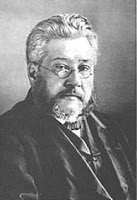Trigonometry and Honesty
"Today I am giving two examinations- one in trigonometry and the other in honesty. I hope you will pass them both. If you must fail one, fail trigonometry. There are many good people in the world who cannot pass trig, but there are no good people in the world who cannot pass the examination of honesty"
- Madison Sarratt of Vandervilt University
Our Daily Bread, Vol. 31/ July 10, 1986
If they hated Spurgeon, keep in mind that they hated Christ first
(John 15:18)
Observe that the enemies of Charles Spurgeon in the "Downgrade Controversy" denied some of the essentials of the evangelical faith:
1. the imputation of Adam's sin
2. the imputation of Christ's righteousness
3. the doctrine of everlasting conscious punishment
4. the verbal inspiration of the Scriptures
5. the Trinity
"We are now at the parting of ways, and the younger ministers especially must decide whether or not, they will embrace and undisguisedly proclaim that the 'modern thought' which in Mr. Spurgeon's eyes is a 'deadly cobra' while in ours it is the glory of the century. It discards many of the doctrines dear to Mr. Spurgeon and his school, not only as untrue and unscriptural, but as in the strictest sense immoral; for it cannot recognise the moral possibility of imputing either guilt or goodness, or the justice of inflicting everlasting punishment for temporary sin. It is not so irrational as to pin its faith to verbal inspiration or so idolatrous as to make its acceptance of a true Trinity of divine manifestation cover polytheism."
-Christian World
cited in
R.J. Sheehan's C.H. Spurgeon and the Modern Church
Ano nga ba ang aking istilo sa pagsusulat?
In this site, you can submit a few paragraphs of your work for "statistical analysis". Based on your word choice and writing style, the site will tell "
which famous writer you write like".
I submitted
"Beautiful Extravagance", and the result was a name I never heard before-- I write like
H.P. Lovecraft, "
American author of horror, fantasy and science fiction, especially the subgenre known as weird fiction" !!! (Wikipedia)
The Influence of Books and Teachers
"If I had even the faintest clue when I was younger as to how profound an impact books and professors would have upon my life, I would have kept a better record of my thoughts and emotions. Why? Because some books and teachers leave indelible fingerprints on our souls. And when those fingerprints are left, it's as if your DNA has changed. Our physical body takes on characteristics because of our chemical DNA. Likewise, those whom we've read and those whose feet we have studied will transform our passions, power and purpose."
-Ravi Zacharias
Just Thinking (Winter 2003), p.1
also appeared in the book Indellible Ink:
22 Prominent Leaders Discuss the Books That Shaped Their Faith (Ed. Scott Larsen)






